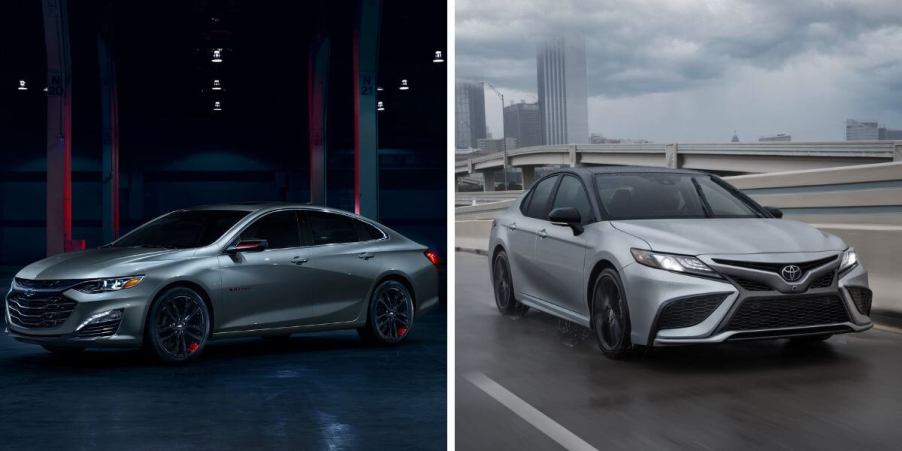
2024 Chevy Malibu vs. 2024 Toyota Camry: Midsize Sedan Melee!
The rumor mill had been swirling for quite some time that Chevy Malibu was on its way to the great scrapyard in the sky to become another American sedan to get the axe from its manufacturer. However, the Malibu has survived the chopping block, and as such, it continues to take on the wildly popular Toyota Camry. So, how do these midsize sedans compare?
The Toyota Camry is more powerful and offers a choice of powertrains
The 2024 Toyota Camry is offered with two gas-only engines and a hybrid option, while the same drivetrain powers all 2024 Chevrolet Malibu models.
The Camry’s base gas-only engine is an inline four-cylinder delivering 203 horsepower and 184 lb-ft of torque. The Malibu’s 1.5-liter turbocharged four-cylinder produces 160 hp and 184 lb-ft of torque, giving the base Camry a 43-horsepower edge, though the torque between the models is identical.
The Camry’s engine pairs with a traditional eight-speed automatic transmission. The Chevy is equipped with a continuously variable transmission (CVT).
Neither powertrain is particularly quick, but Camry owners can also select a 301-horsepower V6 available in higher trims. Toyota also offers all-wheel drive for the Camry, while the Malibu sends its power exclusively to the front wheels.
The Malibu and Camry are equally spacious
There’s not much separating passenger or cargo accommodations between the models.
For instance, the Chevy Malibu offers an inch more headroom (39.1 inches) than the Camry, but the Toyota offers slightly more front legroom. It’s a similar story for rear passenger space, with neither model holding a clear advantage.
Cargo space is also similar. The Malibu’s trunk will hold 15.7 cubic feet of stuff, 0.6 cubic feet more than the Toyota Camry. Both models have a 60/40-split folding rear seat as standard.
The Camry is surprisingly more efficient
It would be understandable to expect the Chevy Malibu’s lower power output and use of a CVT would carry an efficiency advantage, but the Toyota holds the edge. Per EPA testing, the front-wheel drive Camry with the base engine is rated for 32 or 31 combined mpg, dependent on trim, more than the Malibu’s 30 combined mpg.
Toyota Camry models with all-wheel drive are rated lower, for either 28 or 29 combined mpg depending on trim. However, those wishing to upgrade to a Camry Hybrid model will obviously see improved fuel economy.
The Chevrolet Malibu is the more affordable option
The 2024 Chevy Malibu and Toyota Camry are both affordable options in the midsize sedan market, but the Chevy holds the edge in price.
The Malibu starts at $26,195 with a destination charge, while the Camry commands $27,515, giving the Malibu a $1,320 edge on the affordability front. In fact, the Malibu’s mid-level RS trim is still a few hundred dollars less than a base Camry.
Both models have similar warranties. Each offers a three-year/36,000-mile basic warranty and a five-year/60,000-mile drivetrain warranty. However, Chevrolet offers five years/up to 60,000 miles of roadside assistance, while Toyota delivers two years/unlimited miles.
Overall comparison of the Toyota Camry and Chevy Malibu
Both the Chevy Malibu and Toyota Camry are beginning to show their age against more modern midsize family sedans like the Honda Accord, Kia K5, or Hyundai Sonata. As such, there are rumors both models will be redesigned for the 2025 model year.
Until then, the Malibu remains among the most affordable options in its class, and it comes with a respectable list of standard amenities for the price. The Chevy also delivers a comfortable ride, spacious accommodations, and agreeable driving dynamics, but its plasticky interior and paltry powertrain hold it back.
The Camry continues to deliver on Toyota’s steadfast reliability reputation, and it’s also relatively comfortable and presents good value. However, it can’t deliver the same level of initial value as some of its counterparts and lacks some of their refinement.




